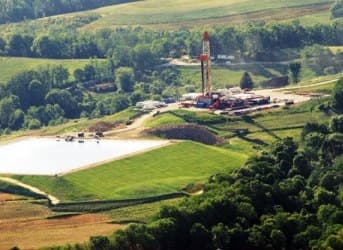While the natural gas extraction technique of hydraulic fracturing, more familiarly known as “fracking,” has engendered rising controversy in the U.S. and Europe, South Africa has no doubts about the value of the process.
Last week South African Energy Minister Dipuo Peters told journalists, "As the department responsible for the security of the country’s energy supply, we are conflicted when it comes to issues related to shale gas. We are conflicted because we've got to look at South Africa becoming self-reliant in terms of energy resources, and if we are informed that there is potential for this resource, it is correct for us to encourage the Departments of Science and Technology and Mineral Resources to make it possible if it is proven. Let's extract it and let's make sure that our own National Environmental Management Act makes it possible that we extract it safely. While we're waiting for a report from the Cabinet, it is my wish and prayer that when the report is tabled, if it says that the gas is there, we can extract it for the benefit of the people of South Africa. If it's in the best interest for South Africa, let's do it but I am committed to the decision of the Cabinet."
Last year South Africa’s Department of Mineral Resources imposed a moratorium on fracking as it studied the environmental impact allowing companies which had applied to use the process, including Royal Dutch Shell Plc, Falcon Oil & Gas Ltd. and Bundu Oil & Gas (Pty) Ltd. before allowing them to proceed, the department will present a technical report on fracking to the Cabinet on in July, which will then make a decision as to whether to lift the moratorium.
At least one bidder, Royal Dutch Shell, has attempted to influence the government’s decision. In 2011 Royal Dutch Shell commissioned a survey that speculated that the country’s Great Karoo desert region natural gas reserves could hold up to 485 trillion cubic feet (tcf), the equivalent of 400 years of oil consumption in South Africa.
The report argued that even if the Karoo in fact contained only four percent of the estimated reserve, or 20 tcf, it would nevertheless boost South Africa’s gross domestic product (GDP) by $9.5 billion and government revenue by $4.19 billion annually, along with creating 300,000 permanent jobs. Critics argued that the fact that the report was paid for by Royal Dutch Shell undermined its integrity.
Whatever the truth of the Karoo’s reserves and Royal Dutch Shell’s roseate predictions for South Africa’s fiscal and employment benefits should it allow fracking to go forward, the grim reality for South Africa is that it is not self-sufficient in energy. South Africa currently imports about 67 percent of its oil consumption, of which more than 26 percent comes from Iran, and 65 percent of natural gas, which is piped in from neighbouring Mozambique. Quite aside from the financial haemorrhaging of paying for energy imports, there is a rising political price attached as well. Iran oil imports, which in March cost $435 million, will after 1 July become illegal under the tightened UN sanctions regime.
Small wonder then that Minister Peters noted during a recent departmental meeting, "It would be wrong for us to not use the resources that God left us with. This is a blessing that God gives us, and we need to exploit for the benefit of the people" before noting that
the people of the Karoo were "going hungry."
All of which led a South African journalist to headline his article, “It’s a done deal on fracking.” So the only remaining question seems to be how much natural gas the Almighty left in the “Great” Karoo’s 154,440 square miles if the government approves opening up the region for shale gas production.
And how much of the revenue generated will go to alleviating the hunger of the Karoo’s people.
By. John C.K. Daly of Oilprice.com


















